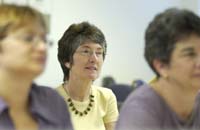Sustainable development in the higher education classroom: perspectives from area studies and development studies
Date: 19 March, 2010
Location: University of Birmingham
Event type: Seminar
Location map | Programme | Event report

Sustainable development has been identified as a key priority by the UK funding councils and by the Higher Education Academy.
Sustainability literacy is an attribute to which graduates of all disciplines should aspire. To date, there has often been comparatively limited knowledge exchange between the fields of Area Studies and Development Studies, but the global and interdisciplinary nature of both subjects would suggest that both ought to be primary sites for engaging with questions of environmental sustainability and climate change.
Event reports
by John Canning
Around fifteen colleagues attended this workshop on sustainable development in area studies and development studies courses. The day was introduced by Dick Ellis, Head of American and Canadian Studies at the University of Birmingham.
Anna Hartnell, Lecturer in American Literature and Culture at the University of Birmingham teaches two sessions of her course on the African-American experience on examining the racial politics of Hurricane Katrina as exhibited through political and media discourses. Residents of New Orleans were frequently referred to as ‘refugees’ implying that the predominantly African-American population of pre-Katrina New Orleans were somehow foreign and ‘Third World’. Dr Hartnell went on to speak about the rebuilding of New Orleans and the intersections of race, neighbourhood rebuilding and environmental issues with green space replacing poorer neighbourhoods, whilst wealthier neighbourhoods are being rebuilt, despite their environmental vulnerability. In the classroom she discusses two films: Spike Lee’s When the Levees Broke http://www.bbc.co.uk/bbcfour/documentaries/storyville/when-levees-broke.shtml and MacGillivray Freeman’s A hurricane on the Bayou, narrated by Meryl Streep http://www.hurricaneonthebayou.com/html/.
Elizabeth Oglesby from the University of Arizona introduced her paper by talking about the funding of Area Studies in the USA. ‘Title VI’ is large block funding available from the federal government through open competition. Area Studies in the USA can be been seen very much as a US Cold War project which has increased in prominence again since the events of 11 September 2001. Dr Oglesby spoke about an immersion programme which students of Latin American Studies can attend. Taking place in the summer months the students work with grassroots community projects in Guatemala where they are taught by members of the communities in which they are working. About 50 students take part each year and it has proven to be a highly transformative experience with many students going on to postgraduate studies. Barriers include language training for geography (as opposed to Latin American Studies) majors and cost of the summer programme (around $4000) for which it is not always possible for students to get financial aid.
Michael Tribe from the University of Bradford was unable to present his paper at this workshop, but a copy of the draft Development Studies benchmarking statement is available from Dr Tribe.
George Hall from the University of Central Lancashire spoke about the sustainable development module available to all first year students. UCALN has sought to integrate its teaching, research and estates work in sustainable development, for example in the development of the wind farm at the Preston Sports Arena which has drawn on the expertise of staff in engineering. http://www.uclan.ac.uk/scitech/computing_engineering_physical/wind_energy_engineering.php The module ‘Issues in Sustainability’ consists of one hour lectures followed by a one hour discussion. Contributing disciplines include ecology, waste management, tourism and transport. Future challenges include integrating sustainable development further into the second and third year curriculum.
Jennifer Elliot from the University of Brighton spoke about embedding sustainable development in an institutional context. She received a small grant from the subject Geography, Earth and Environmental Sciences Subject Centre http://staffcentral.brighton.ac.uk/clt/ESD/tag/geography.html to carry out an audit of sustainable development teaching at Brighton which found that 40% of modules had some sort of engagement though some of this engagement was not explicitly concerned with sustainable development (.e.g. work on corporate responsibility). The COASTAL project funded by the ESCALATE (Education) Subject Centre identified and shared strategies across the university http://escalate.ac.uk/3937. New modules have been set up including a field trip to Gambia focused on sustainable tourism. Geology students are able to take a course where they role-play different interests in sustainability related scenarios. In questions Dr Elliott observed that sustainable development can be explicitly linked to the quality agenda on the grounds that it is no longer possible to have ‘quality graduates’ who do not know about sustainable development.
At the end the day a plenary was held to discuss ways forward. It was agreed that LLAS would attempt to collect further case studies into sustainable development in languages, linguistics and area studies as well as sharing teaching resources through the humbox www.humbox.ac.uk – this could include keywording existing resources as sustainable development where applicable. Small grant funding would also be welcomed. We were also reminded that sustainable development embodies many ideas including social justice which is a value we would like all graduates to have.
